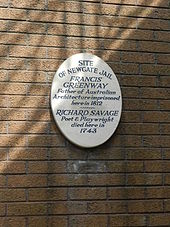Richard Savage (poet)
[3] The first recorded occurrence of his name dates back to 1715, when he identified himself as "Mr. Savage, natural son to the late Earl Rivers" after being arrested for possessing a censored political pamphlet."[6] Haywood was also lampooned as nothing more than a literary prostitute in Alexander Pope's The Dunciad, for which Savage was one of the chief sources of petty gossip about the "dunces" of Grub Street portrayed in the satire.Savage's relationship with Hill, which developed over a period of ten years, proved instrumental in providing him with the most important contacts in his career and, above all, in launching a persistent campaign to extort recognition and money from Mrs Brett.Merchant, not being satisfied with being told to wait for a party of guests to depart, started a brawl in which Savage, amid the chaos, apparently stabbed and mortally wounded one James Sinclair, as well as injuring a maid.[11] Further statements by Nuttal and Jane Leader, an employee at Robinson's, clearly established that in his final dying words Sinclair explicitly identified Savage as the man who stabbed him.Poet and playwright Charles Beckingham wrote a defensive pamphlet called The Life of Mr. Richard Savage, and even Lord Tyrconnel, Mrs Brett's own nephew, petitioned to the king and queen for a pardon.[15] Savage's conviction for murder and the subsequent pardon gained him a considerable amount of fame, and his story was sought over by booksellers and discussed in salons and coffeehouses, along with the behaviour of Mrs Brett.His newfound fame prompted him to publish in 1728 a confessional poem titled The Bastard, which made explicit mention of Mrs Brett, his trial and the pardon by the queen, and discarded his previous image of "poor poet" in favour of a celebration of his own genius.Savage apparently obtained this through repeated extortion, as Johnson recounts that he "threatened to harass her [Mrs. Brett] with Lampoons, and to publish a copious Narrative of her Conduct, unless she consented to purchase an Exemption from Infamy, by allowing him a Pension."[22] How their friendship began is equally unclear, but Johnson relates having often accompanied Savage on his nighttime wanderings about London, where he witnessed the poet's poverty and frequent occurrences of public humiliation.To save him from poverty, his longtime friend Alexander Pope launched a campaign involving several of his philanthropic acquaintances, including Ralph Allen, James Thomson and David Mallet.[25] Pope also tried to push Savage into writing a letter to Sir William Leman, Mrs Brett's legitimate daughter's husband, begging him to intervene on his behalf with Lord Tyrconnel.Discrepancies in Savage's story made James Boswell suspicious, but the matter was thoroughly investigated for the first time by William Moy Thomas, who published the results of his research in Notes and Queries.

Charles WhiteheadEnglandBristolRichard Savage, 4th Earl RiversSamuel JohnsonLife of SavageLives of the English PoetsLife of Mr Richard SavageEdward CaveThe Gentleman's MagazineCharles Gerard, 2nd Earl of MacclesfieldSir Richard MasonColonel Henry BrettHolbornSt AndrewCovent GardenSt AlbansMrs BrettWest IndiesBishop HoadlyLove in a VeilSir Richard SteelepatronRobert Wilkstitle roleSir Thomas OverburyEliza HaywoodsatireAlexander PopeThe DunciadGrub StreetAaron HillJohn DyerJames ThomsonJudge PageCharing CrossNewgate PrisonmanslaughterOld BaileymurderFrancis Pagepardon from the CrownCharles BeckinghamTyrconnelQueen CarolineMr. PopeThe SeasonspensionRobert WalpoleRalph AllenDavid MalletSwanseaEarl RiversSt Paul's, Covent GardenJames BoswellWilliam Moy ThomasNotes and QueriesJ. M. BarrieH. B. Marriott WatsonCriterion TheatreSavage ClubHalliday, AndrewJacob, GilesJohnson, SamuelThomas, W. Moypublic domainChisholm, HughEncyclopædia BritannicaList of abolitionist forerunnersOpen LibraryProject GutenbergInternet Archive